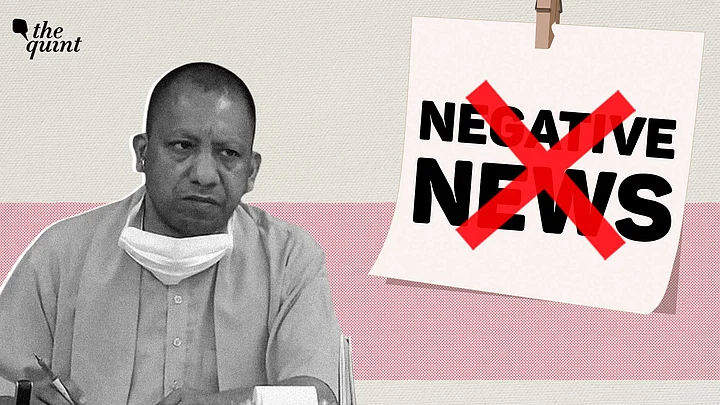The Yogi Adityanath-led Uttar Pradesh government has, in a circular, directed its information officers across the state’s districts to do a better job at tracking newspapers for “negative news” as it is “tarnishing the image of the government”. The circular further says that if the news is “baseless” then the said newspaper’s editor or local reporter should be asked by the concerned department to publish the “correct facts” of the case.
The circular, accessed by The Quint, says that if any newspaper doesn’t then publish these “correct facts”, this matter should be brought to the notice of the additional chief secretary of the UP government’s information and PR department— Navneet Sehgal. The circular has been written by Sehgal, and sent to all the district information officers in the state.
The circular was sent on 5 August, incidentally the same day that BJP leader Shrikant Tyagi’s video abusing and arguing with a woman inside a Noida housing society went viral.
'Baseless' News Causing 'Anti-Government Views'
The circular says that many news items being published about events related to different districts of UP aren’t being tracked or taken note of by the district information officers.
“As a result, at the district level, negative news being published isn’t being deliberated upon nor is there any investigation being done on such news. This is tarnishing the government’s image at the district and state level,” the circular states.
The circular goes on to say that many a times “baseless” news items are published in newspapers which when not countered timely lead to “the masses developing views against the government, which causes an adverse effect on the image of the government.”
“Deep disappointment has been expressed at the top-most level” on this matter, the letter further says.
Action To Follow In Case Of 'Negative' News
A four-point action plan has been directed for the information officers to follow going forward, as part of which they are required to make cuttings of the news reports published about their districts: both positive as well as negative.
The information officers are then supposed to submit these cuttings to the district magistrates, who will make note of the negative news pieces and get detailed reports from the concerned government departments on the same, every day before 6 pm.
“...If that news report is baseless or against facts then the editor/local representative of that newspaper will be informed by the concerned department and correct facts will be made available to them and they will be requested to publish the correct facts in the newspaper,” the circular says.
Further, the circular states that “if at the local level any newspaper publishes any such report which is baseless or against facts and if the newspaper doesn’t publish the correct facts for the public then this can be brought to the knowledge of the additional chief secretary.”
Finally, there is also an additional point about advertisements in the circular: no district offices or government bodies or local bodies can get any advertisement published in any newspaper without the permission of the district magistrate. Both the ad, as well as which paper the ad is to be published in, must only be determined by the DM, the circular says.
Just Keeping In Touch With Journalists: Information Chief Secretary
Speaking to The Quint, bureaucrat Navneet Sehgal who is the signatory on the circular, justified it. “It’s an internal circular. Every government is allowed to keep track of such news,” he said.
Asked if there might be attempts to censor media given the emphasis in the circular to get the editor/journalist to publish news countering what the government sees as “baseless” or “negative”, he dismissed it as “keeping in touch with journalists.”
“We have to stay in touch with journalists...is that a crime? For example, I am also picking up your phone,” he said.
Sehgal refused to comment further. The Quint had sent a detailed questionnaire to the additional chief secretary, but there hasn’t been any response yet. The report will be updated once there is a reply.
(At The Quint, we question everything. Play an active role in shaping our journalism by becoming a member today.)
